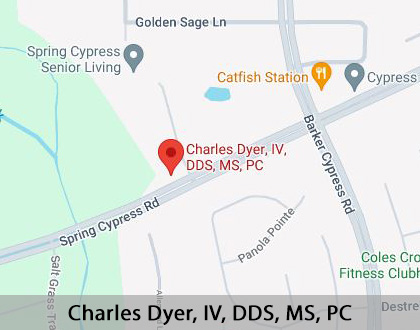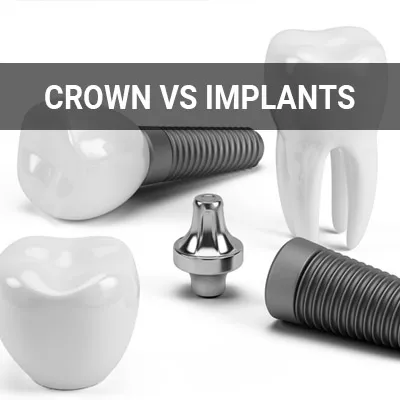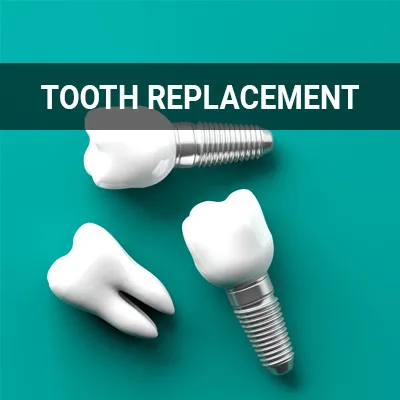Crowns Cypress, TX
Crowns are tooth-replacement options that can help restore both the function and appearance of worn down, broken, or cracked teeth. Teeth are an essential part of your smile and facial appearance. For many people, having natural-appearing and functional teeth plays a significant role in their satisfaction when chewing, talking, and going about their daily lives.
Crowns can help support teeth and their surrounding structures and work much like natural teeth. For more information about crowns, our team at Charles E. Dyer IV, DDS, MS, PC in Cypress is here to help. Call us at (281) 213-0900 to learn more.
Crown Basics
A crown is an artificial covering that we can place onto a natural tooth root or dental implant. This "cap" restores the appearance of a tooth and makes it stronger. Crowns are custom-made and generally cover the entire tooth from the gum line.
This type of treatment can be especially useful for patients who have a cavity or tooth defect that encompasses a large tooth region, untreatable with a filling. Crowns can also help restore cracked or worn down teeth, attach dental bridges, or cover teeth after a root canal. If a patient is missing a tooth and has a bothersome gap, a crown can fill it while also making it easier to eat and speak.
“This type of treatment can be especially useful for patients who have a cavity or tooth defect that encompasses a large tooth region, untreatable with a filling.”
Types of Dental Crowns
Crowns can consist of a variety of different materials. The chosen material generally depends on the patient's particular dental condition and preference. Many people choose the color of their crown based on the color of their surrounding natural teeth.
Some common crown materials include:
- Metal alloy: A mixture of gold with other metals that offer the benefit of being strong and resistant to chipping. However, because gold is not natural-appearing, it is generally reserved for back teeth out of view.
- Ceramic: Ceramic crowns, such as those made with zirconia or lithium disilicate, are extremely strong and durable. According to the Journal of the American Dental Association (JADA), dentists find that zirconia restorations, in particular, are useful because of their strength and resistance to breaking.
- Porcelain: This crown material provides the most natural look and is ideal for the front teeth.
- Porcelain-fused-to-metal: These materials are a common option since they closely resemble the appearance of a natural tooth but have the added strength of metal underneath.
When helping the patient select a crown, we will also consider the position in the mouth and how much force will be applied to the tooth. Sometimes, a mixture of materials is necessary.
“The chosen material generally depends on the patient’s particular dental condition and preference.”
Benefits of Dental Crowns
A crown can be a great restorative option for those with missing teeth that have caused a gap. We can also combine a crown with a dental implant to fill a gap while also helping to improve chewing and speech. Crowns also have the benefit of protecting teeth that have had a root canal or have been severely weakened or decayed.
Crowns can have physical aesthetic benefits as well. They cover discolored or misshapen teeth and can also support the alignment and structures of the jaw, enhancing the appearance of a smile. A periodontist or dentist may recommend a crown to help improve the functional performance or enhance the visual appearance of a patient's teeth — or both.
“A crown can be combined with a dental implant to fill a gap and help improve chewing and speech.”
Check out what others are saying about our dental services on Yelp: Crowns in Cypress, TX
Process of Applying a Crown
Once a patient decides to get a crown, the process generally involves a few steps. The crown application process may slightly differ depending on the type of crown material chosen. However, the first visit typically entails the following:
- Tooth preparation (decay removal, root canal, etc.) and reshaping
- Making a customized mold of the tooth so that it fits perfectly into position
- Applying a temporary crown to protect the tooth until the permanent crown is created (this typically takes two weeks)
During the second visit, we will apply the permanent crown to the tooth using cement material. The crown application process may have fewer steps if the dental specialist has an onsite device that prepares same-day crowns. However, the traditional process involves at least two trips to the dental office.
“The crown application process may slightly differ depending on the type of crown material chosen.”
Questions Answered on This Page
Q. What types of materials are used for dental crowns?
Q. What are the benefits of a crown?
Q. How do I take care of a crown?
People Also Ask
Q. What are the benefits of dental crowns and dental implants?
Q. What are the types of tooth replacements?
Q. Do I need surgical periodontics?
Q. What different types of regenerative procedures do periodontists perform?
Q. What are the complications from ignoring preventative care?
Follow-Up Care
After placing a crown, the patient will likely have periodic evaluations to help ensure it remains functional and in good condition. The patient will still need regular dental checkups, and appointments to ensure the crown is in proper condition. Patients should care for a crown the way they take care of their natural teeth to maintain their quality — brush twice daily, floss daily, and use mouthwash.
To support the health of a crown, avoid harmful habits such as smoking or biting on hard items, such as hard candy or fingernails. This can weaken the crown and make it vulnerable to breaking. If a crown breaks or cracks, follow up immediately to protect the underlying tooth and place a new crown in.
“Patients should care for a crown the way they take care of their natural teeth to maintain their quality — brush twice daily, floss daily, and use mouthwash.”
Frequently Asked Questions
Q. Is a crown placement considered a cosmetic procedure?
A. It can be, as crowns can improve the appearance of your smile. According to the American Dental Academy (ADA), crowns can cover discolored or misshapen teeth. Crowns often serve multiple purposes, positively affecting both the appearance and function of your teeth.
Q. How long does crown placement take?
A. Placing a crown can be done in one or two appointments, depending on the type of restorative procedure. If the patient needs a dental crown following a root canal or dental implant procedure, then they will receive it at a separate appointment. Whereas, it is possible to place a crown on a natural tooth on the same day. In most cases, however, a temporary crown is put in until the permanent crown is made, which can take two weeks.
Q. Is getting a crown painful?
A. No. A dentist or periodontist will use numbing medicine at every point of the process to ensure that you do not feel any pain. You may feel pressure during the procedure and have slight soreness or sensitivity afterward, but these symptoms should be manageable with pain medications.
Q. How long does a dental crown last?
A. Dental crowns do not last forever, but they can last a long time with proper care and maintenance. The type of material used can affect its lifespan. In general, the Cleveland Clinic notes that crowns last between 5 and 15 years, depending on the patient's care routine and dental visits.
Q. What do crowns cost?
A. The cost of a dental crown will vary based on the type of material used. However, experts note the price range is generally between $1000 and $3500. Discuss your treatment options, and their costs, with your dentist or periodontist when making a treatment decision for your situation. We recommend speaking with your insurance provider to understand what your plan covers and any necessary co-pays prior to treatment.
Start Feeling Better – Visit Us Today
By visiting us as soon as possible, our team can help get you the professional treatment you need. Instead of waiting around and allowing the symptoms to get worse, we can provide you with treatment options.
Definitions
Call Us Today
Crowns can greatly aid in improving the function and appearance of the mouth, especially for those with broken or cracked teeth. If you are interested in getting a crown restoration or would like more information, contact our team today at (281) 213-0900.
Helpful Related Links
- American Academy of Periodontology (AAP). American Academy of Periodontology (AAP). 2023
- Center for Disease Control and Prevention (CDC), Periodontal Disease Page. Center for Disease Control and Prevention (CDC), Periodontal Disease Page. 2023
- WebMD, What Is a Periodontist?. WebMD, What Is a Periodontist?. 2023
About our business, license, and website security
- Charles E. Dyer IV, DDS, MS, PC was established in 2007.
- We accept the following payment methods: American Express, Cash, Check, Discover, MasterCard, and Visa
- We serve patients from the following counties: Harris County, Washington County, and Waller County
- We serve patients from the following cities: Cypress, Houston, Katy, Spring, The Woodlands, Brenham, Waller, Sugar Land, Jersey Village, and Hempstead
- TX (License #21174). View License Information and Specifics
- National Provider Identifier Database (1285771352). View NPI Registry Information
- Healthgrades. View Background Information and Reviews
- Norton Safe Web. View Details
- Trend Micro Site Safety Center. View Details
Back to top of Crowns










